

Mental and Physical Activities Delay Cognitive Decline in ... Study Shows Tai Chi and Dance Benefit the Brain in Older Adults. When it comes to taking care of your brain and your body as you age, a new study suggests you may want to consider adding a dose of ballroom dancing to your health regimen.
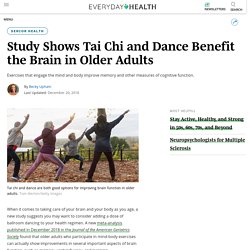
A new meta-analysis published in December 2018 in the Journal of the American Geriatrics Society found that older adults who participate in mind-body exercises can actually show improvements in several important aspects of brain function, such as memory, verbal fluency, and learning. These findings are not surprising considering that we already know that mental activities and physical activities are good for the brain, says Neda Gould, PhD, a clinical psychologist and assistant professor of psychiatry and behavioral sciences at Johns Hopkins University School of Medicine in Baltimore, who was not involved in this research.
“It makes sense that when we combine the two, it would still be good, but it is helpful to have data that backs up this assumption,” says Dr. Gould. RELATED: Dance Your Way to a Healthier Aging Brain. Tai Ji Quan and Cognitive Function in Mild Cognitive Impairment. This study will compare the effects of a cognitively enhanced tai ji quan intervention with standard tai ji quan and light exercise in older adults with mild cognitive impairment.
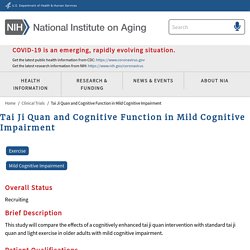
October 15, 2019 December 2023 Complaint of memory lossNo or very mild dementia (Clinical Dementia Rating Scale score of 0.5 or less)Normal general cognitive function (Mini-Mental State Examination score of 24 or more)Capable of exercising safely, as determined by a healthcare provider Having medical conditions likely to compromise survival or prevent physical activity, such as metastatic cancer or severe heart failureParticipating in any type of tai ji quan or daily and/or structured vigorous physical activity (e.g., brisk walking for 30 minutes or longer or weight lifting on 3 or more days per week) 3 months prior to the study. The Impact of Tai Chi on Cognitive Performance in Older Adults: A Systematic Review and Meta-Analysis. The effects of Tai Chi exercise on cognitive function in older adults: A meta-analysis.
B.L.
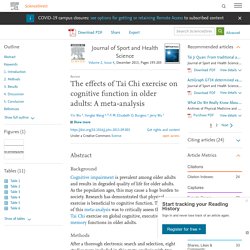
Plassman, K.M. Langa, G.G. Fisher, S.G. Heeringa, D.R. Weir, M.B. Ann Intern Med, 148 (2008), pp. 427-434 L.E. Alzheimer Dis Assoc Discord, 15 (2001), pp. 169-173 A.A. Neuropsychology, 26 (2012), pp. 534-540 Alzheimer's AssociationAlzheimer's disease facts and figures N.T. J Am Med Assoc, 300 (2003), pp. 1027-1037. Tai Chi is Effective in Delaying Cognitive Decline in Older Adults with Mild Cognitive Impairment: Evidence from a Systematic Review and Meta-Analysis. To determine whether Tai Chi (TC) is effective in slowing cognitive decline in older populations with mild cognitive impairment (MCI), we performed a systematic review and meta-analysis of randomized controlled trials (RCTs) on Tai Chi and MCI.
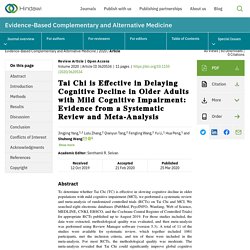
We searched eight electronic databases (PubMed, PsycINFO, Wanfang, Web of Science, MEDLINE, CNKI, EBSCO, and the Cochrane Central Register of Controlled Trials) for appropriate RCTs published up to August 2019. For those studies included, the data were extracted, methodological quality was evaluated, and then meta-analysis was performed using Review Manager software (version 5.3). A total of 11 of the studies were available for systematic review, which together included 1061 participants, met the inclusion criteria, and ten of these were included in the meta-analysis. For most RCTs, the methodological quality was moderate. A sharper mind: tai chi can improve cognitive function. There are lots of jokes about forgetting where you put your keys, but as you get older, changes in your mental function are no laughing matter.
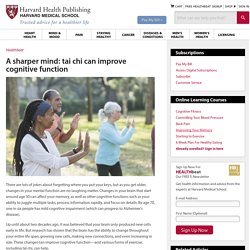
Changes in your brain that start around age 50 can affect your memory, as well as other cognitive functions such as your ability to juggle multiple tasks, process information rapidly, and focus on details. By age 70, one in six people has mild cognitive impairment (which can progress to Alzheimer's disease). Up until about two decades ago, it was believed that your brain only produced new cells early in life. But research has shown that the brain has the ability to change throughout your entire life span, growing new cells, making new connections, and even increasing in size.